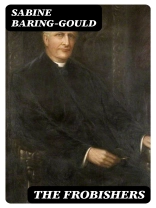In ‘The Frobishers, ‘ Sabine Baring-Gould intricately weaves a narrative that captures the complexities of familial bonds against the backdrop of Victorian society. The novel unfolds through the lives of the Frobisher family, exploring themes of love, loyalty, and social aspiration. With a literary style that blends realism with rich character development, Baring-Gould’s prose is both evocative and methodical, reflecting the moral dilemmas faced by individuals in a rapidly changing world. The historical context of the era enriches the storytelling, making the social fabric of the time palpable and engaging. Sabine Baring-Gould, a prolific writer and folklorist, is known for his deep understanding of rural England and the intricacies of human relationships. His diverse interests from theology to archaeology, coupled with his personal experiences, profoundly influenced his literary output. This blend of scholarly rigor and passionate engagement with people and places informs his narrative style, allowing readers to perceive both the inner lives of his characters and the societal pressures they navigate. ‘The Frobishers’ is highly recommended for readers seeking a deep, reflective engagement with Victorian themes and the human condition. Baring-Gould’s work not only entertains but also invites readers to ponder their circumstances, making it a valuable addition to both literature enthusiasts and scholars alike.
Giới thiệu về tác giả
Sabine Baring-Gould (1834-1924) was a prolific English writer, antiquarian, folk song collector, and clergyman with an enduring legacy in both literature and church history. Born on January 28, 1834, in Exeter, Devon, Baring-Gould displayed a multifaceted career spanning across various domains, showing both scholarly aptitude and creative flair. He is perhaps best known for penning the hymn ‘Onward, Christian Soldiers’ and his publication ‘The Lives of the Saints’, which resonated with Victorian spiritual sentiments and scholarly interests in hagiography. With an educational background from Clare College, Cambridge, he carried his academic rigor into his writing and ecclesiastical roles. His literary works, of which ‘The Frobishers’ serves as an example, often delved into aspects of history, folklore, and social narratives, weaving intricate tales that reflect his erudition and keen observational skills. Baring-Gould’s narrative style frequently incorporated elements from his comprehensive knowledge of myth, legend, and local customs, which was also evidenced in his considerable work on folk songs of England, notably compiled in ‘Songs of the West’. Sabine Baring-Gould’s contribution to literature and cultural history has been appreciated through numerous reprints of his works and continued scholarly interest in his wide-ranging intellectual pursuits. His ability to capture the essence of his times while engaging with diverse subjects has left a marked impression on English cultural heritage.












